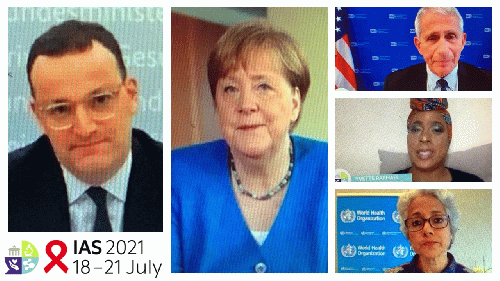
Do not neglect TB or HIV or other health needs while responding to Covid-19
(Image by CNS) Details DMCA
Covid-19 has posed innumerable health, economic, and social challenges for all, including people living with HIV. It has exposed the fragility of health systems around the globe and has diverted political attention and funding from other infectious diseases like TB and HIV. The opening session of the 11th International IAS Conference on HIV Science (#IAS2021) held virtually from Berlin, saw a lively panel discussing the tale of the two most horrendous recent pandemics in the history of our civilisation: Covid-19 and HIV/AIDS.
Here is a glimpse of what the scientists, politician and activist had to say:
Intersectionality of Covid-19 and HIV
Dr Anthony Fauci, Director of National Institute of Allergies and Infectious Diseases, USA, said that we cannot forget HIV just because we happen to be in the middle of Covid-19. Decades of investment and science in HIV research, albeit as yet unsuccessful in developing an HIV vaccine, has played a major role in the development of highly successful Covid-19 vaccines in a very short period of time. But the fact that we have a Covid-19 pandemic does not lessen the importance and devastation associated with the HIV pandemic that has resulted in substantial mortality and morbidity during the last 40 years.
Dr Fauci said that in terms of preparedness for future pandemics (which will be there) we are better prepared in some respects, but in others we are not. To deal with any emerging outbreak there is a public health response and there is a scientific response. The public health response for Covid-19 has been fragmented in many countries. It was characterised by a disturbing degree of divisiveness when there was a politicisation of how one approaches an outbreak. When you are dealing with a pandemic, the common enemy is the virus, and not the people you may have disagreements with. A global pandemic requires a global response in a synergistic way, and not just an individual country response.
Fortunately, the scientific response has been tremendous and resulted in the rapid development of effective and safe vaccines, said Dr Fauci. The challenge now is to get equitable distribution of these vaccines throughout the world. The rich countries of the world have a moral obligation to ensure that the low and middle income countries are able to access these life saving vaccines in real time.
Dr Fauci shared that an important lesson learnt is to have a global system so that life saving scientific interventions can be rapidly distributed to people in real time without them having to suffer unnecessarily.
Lessons learnt from HIV to address inequalities in the Covid-19 response
(Note: You can view every article as one long page if you sign up as an Advocate Member, or higher).





